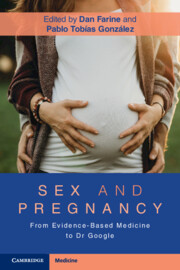Book contents
- Sex and Pregnancy
- Sex and Pregnancy
- Copyright page
- Dedication
- Contents
- Contributors
- Preface
- Section 1 General Issues
- Section 2 Specific Issues
- Chapter 9 Sex and Assisted Reproductive Technologies
- Chapter 10 The Male Partner’s Perspective
- Chapter 11 Sex in the First Trimester
- Chapter 12 Sex in the Second and Third Trimesters
- Chapter 13 Sex with Bleeding in the First Trimester
- Chapter 14 Sex with Bleeding in the Second and Third Trimesters
- Chapter 15 Short Cervix and Sex
- Chapter 16 Preterm Birth and Sex
- Chapter 17 Multiple Pregnancies and Sex
- Chapter 18 Special Pregnancies and Sex
- Chapter 19 Air Embolism Related to Sex in Pregnancy and the Postpartum
- Chapter 20 Pelvic and Ovarian Masses during Pregnancy
- Chapter 21 Sexually Transmitted Infections and Pregnancy
- Chapter 22 Sex for Induction of Labor
- Chapter 23 Nipple Stimulation during Pregnancy
- Chapter 24 Sex during the Postpartum
- Chapter 25 Sex after Pelvic Floor Injuries
- Chapter 26 Miscarriages, Spontaneous Abortions, Stillbirths, and Sex
- Index
- References
Chapter 23 - Nipple Stimulation during Pregnancy
from Section 2 - Specific Issues
Published online by Cambridge University Press: 09 November 2022
- Sex and Pregnancy
- Sex and Pregnancy
- Copyright page
- Dedication
- Contents
- Contributors
- Preface
- Section 1 General Issues
- Section 2 Specific Issues
- Chapter 9 Sex and Assisted Reproductive Technologies
- Chapter 10 The Male Partner’s Perspective
- Chapter 11 Sex in the First Trimester
- Chapter 12 Sex in the Second and Third Trimesters
- Chapter 13 Sex with Bleeding in the First Trimester
- Chapter 14 Sex with Bleeding in the Second and Third Trimesters
- Chapter 15 Short Cervix and Sex
- Chapter 16 Preterm Birth and Sex
- Chapter 17 Multiple Pregnancies and Sex
- Chapter 18 Special Pregnancies and Sex
- Chapter 19 Air Embolism Related to Sex in Pregnancy and the Postpartum
- Chapter 20 Pelvic and Ovarian Masses during Pregnancy
- Chapter 21 Sexually Transmitted Infections and Pregnancy
- Chapter 22 Sex for Induction of Labor
- Chapter 23 Nipple Stimulation during Pregnancy
- Chapter 24 Sex during the Postpartum
- Chapter 25 Sex after Pelvic Floor Injuries
- Chapter 26 Miscarriages, Spontaneous Abortions, Stillbirths, and Sex
- Index
- References
Summary
Stimulation of the nipple is known to release oxytocin from the pituitary gland, which in turn causes uterine contractions during pregnancy and in the postpartum period. In this chapter we present nipple stimulation as a method of induction of labor and as one of the available measures to deal with postpartum bleeding. We also include the available internet-based information on nipple stimulation in pregnancy.
- Type
- Chapter
- Information
- Sex and PregnancyFrom Evidence-Based Medicine to Dr Google, pp. 173 - 177Publisher: Cambridge University PressPrint publication year: 2022

